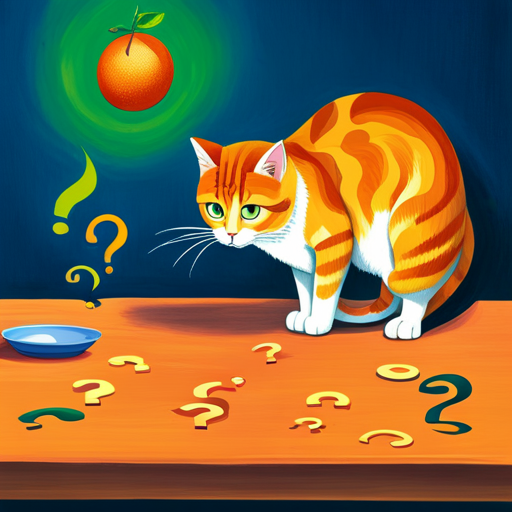Imagine your cat, with eyes wide and curious, pawing gently at a slice of vibrant, exotic passion fruit you’ve placed before them. You’ve heard about the numerous health benefits this fruit could offer humans, but when it comes to your feline friend, you’re treading into unknown territory.
While the allure of introducing a new, nutritious treat to your cat’s diet is tempting, it’s crucial to pause and consider the potential risks and toxins that might lurk within this tropical delight. Before you let your cat indulge, there’s essential information you need to know to ensure their safety and well-being.
Key Takeaways
- Passion fruit contains nutrients beneficial for cats, including vitamins A and C, magnesium, and potassium.
- It may aid in digestive health, immune system function, and support heart and muscle function in cats.
- Introducing passion fruit to cats should be done cautiously, monitoring for adverse reactions due to potential sensitivity.
- Always consult a veterinarian before adding passion fruit or any new fruit to your cat’s diet to ensure it aligns with their health needs.
Understanding Passion Fruit
Before delving into the safety of passion fruit for cats, it’s critical to understand what passion fruit is and its nutritional composition. Originating from South America, specifically Brazil, Paraguay, and northern Argentina, passion fruit boasts a rich history of cultivation that spans centuries. This exotic fruit thrives in tropical to subtropical climates, making its way across the globe through meticulous cultivation methods.
Farmers primarily grow passion fruit through vine training, a method that supports the plant’s rapid growth and facilitates easier fruit harvesting. This climbing vine flourishes in well-drained soil, requiring ample sunlight and regular watering to produce its signature purple or yellow fruits. The fruit’s interior is filled with a vibrant, juicy pulp and numerous seeds, encapsulating its unique flavor and aroma.
Understanding its origins and how it’s cultivated sheds light on the essence of passion fruit. It’s not merely about where it comes from or how it grows, but understanding these aspects provides a foundation for comprehensively assessing its safety and nutritional value for cats. This knowledge is paramount when considering the introduction of any human food, including passion fruit, into a cat’s diet.
Nutritional Benefits for Cats
You’ll find that passion fruit can offer your cat essential nutrients critical for their overall health.
These include vitamins and minerals that support digestive health and enhance immune system function.
Understanding these benefits can help you make informed decisions about incorporating passion fruit into your cat’s diet.
Essential Nutrients Provided
While passion fruit offers a unique blend of vitamins and minerals, it’s crucial to understand precisely how these nutrients can benefit your cat’s health. However, caution is advised due to potential seed dangers and the risk of allergic reactions.
Passion fruit’s nutritional profile includes essential vitamins like A and C, which support vision and immune health, and minerals such as magnesium and potassium, vital for heart and muscle function.
Nevertheless, it’s essential to introduce any new food, including passion fruit, gradually to monitor for adverse effects. Despite its nutritional advantages, the risks associated with seeds and possible allergies can’t be overlooked.
Always prioritize safety and consult with a veterinarian before incorporating new elements into your cat’s diet.
Digestive Health Support
Considering the nutritional benefits previously outlined, it’s important to also highlight how passion fruit can support your cat’s digestive health. The fiber content and hydration benefits are particularly noteworthy:
- Fiber content: Passion fruit is rich in dietary fiber, which can help regulate your cat’s bowel movements, ensuring a healthy digestive tract.
- Hydration benefits: With a high water content, passion fruit can aid in keeping your cat well-hydrated, which is crucial for digestive health.
- Prebiotic effects: The fiber in passion fruit acts as a prebiotic, promoting healthy gut bacteria.
- Ease of digestion: Its soft texture and natural enzymes make passion fruit easily digestible for cats, reducing the risk of gastrointestinal issues.
Incorporating passion fruit into your cat’s diet, therefore, can be a natural way to support their digestive health.
Immune System Boost
Passion fruit’s rich array of vitamins, particularly vitamin C, plays a critical role in bolstering your cat’s immune system. This tropical fruit emerges as an excellent source of antioxidants, which are paramount in combating free radicals that can compromise your cat’s health. The presence of these antioxidant sources in passion fruit assists in strengthening the immune response, thereby fortifying your cat against various diseases.
Moreover, introducing passion fruit into your cat’s diet can aid in allergy identification. Its distinct nutritional profile makes it easier to pinpoint potential allergens affecting your cat’s well-being. By carefully monitoring your cat’s reaction to passion fruit, you’re equipped to discern sensitivities and adjust their diet accordingly, ensuring a tailored approach to enhancing their immune health.
Potential Risks and Toxins
Evaluating the safety of passion fruit for cats involves understanding its potential risks and toxins. While some fruits can be a healthy addition to your pet’s diet, it’s crucial to recognize that not all components of passion fruit are safe for feline consumption.
Here are key concerns to keep in mind:
-
Allergic reactions: Just like humans, cats can exhibit allergic responses to new foods, including passion fruit. Symptoms may include itching, swelling, or gastrointestinal distress. Monitoring your cat closely when introducing any new food item is essential to identify any adverse reactions promptly.
-
Behavioral changes: Ingesting inappropriate substances can lead to noticeable changes in your cat’s behavior. These can range from increased lethargy to agitation or aggression, signaling discomfort or a negative reaction to the fruit.
-
Cyanogenic glycosides: The seeds and rind of passion fruit contain these compounds, which can release cyanide when metabolized. Although small quantities may not be harmful, ingestion of large amounts can be toxic.
-
Gastrointestinal upset: The acidic nature of passion fruit mightn’t agree with your cat’s digestive system, leading to symptoms such as vomiting or diarrhea.
It’s paramount to approach the introduction of passion fruit into your cat’s diet with caution, considering these potential risks and toxins.
Safe Feeding Practices
When considering feeding passion fruit to your cat, it’s crucial to understand the appropriate quantity limits and be aware of potential risks.
You’ll need to ensure that any portion offered doesn’t disrupt their nutritional balance or pose health hazards.
Adhering to these guidelines can help prevent adverse reactions and promote your cat’s well-being.
Quantity Limits
Determining the right amount of passion fruit to safely offer your cat is crucial to avoid any potential health issues. Identifying the appropriate serving size and understanding the possibility of allergic reactions are key steps in ensuring your cat’s safety.
When introducing passion fruit, consider these guidelines:
- Start with a very small serving size to monitor for any adverse reactions.
- Limit the offering to a few small pieces no more than once a week.
- Observe your cat closely for any signs of discomfort or allergic reactions.
- Ensure the passion fruit is fresh and free from any added sugars or preservatives.
Potential Risks
Understanding the appropriate quantity of passion fruit for your cat is essential, yet it’s equally important to recognize the potential risks associated with its consumption.
Feeding passion fruit without proper knowledge can lead to allergic reactions, which manifest as skin irritations, digestive disturbances, or respiratory issues. You must observe your cat closely after introducing passion fruit into their diet for the first time. Additionally, behavioral changes, such as increased lethargy or agitation, can signal that the fruit doesn’t agree with your pet.
These symptoms may not appear immediately but monitoring your cat for any adverse reactions over time is crucial. In essence, while passion fruit can be a delightful treat, it’s vital to proceed with caution to ensure your cat’s health and well-being.
Alternative Fruits for Cats
If you’re considering offering your cat a fruity treat, it’s essential to choose options that are safe and beneficial for their health. Feline allergies and water content are critical factors to consider when selecting suitable fruits. While many fruits are safe in moderation, always introduce new foods gradually to monitor for any adverse reactions.
Here are some alternative fruits that are generally considered safe for cats:
- Cantaloupe: High in water content, cantaloupe can be a refreshing treat for cats, especially during warmer months. It’s also a source of antioxidants and vitamins.
- Blueberries: These small berries are packed with antioxidants and vitamins. Their small size makes them a convenient snack for cats.
- Watermelon: With its high water content, watermelon can help keep your cat hydrated. Ensure it’s seedless and offered in small quantities.
- Apples: Apples (without the seeds and core) can provide a crunchy treat for your cat, offering fiber and vitamins. Always serve them in small, manageable pieces to avoid choking hazards.
Consulting With a Veterinarian
Before introducing passion fruit or any new fruit to your cat’s diet, it’s crucial to consult with a veterinarian to ensure it’s safe and appropriate for their specific health needs. This step is paramount in preventing any adverse effects that could arise from dietary changes. Veterinary professionals possess the expertise to evaluate whether passion fruit, known for its nutritional benefits in humans, aligns with your cat’s health requirements and dietary restrictions.
When planning a consultation, it’s important to consider veterinary costs and appointment availability. Veterinary costs can vary widely based on location, the clinic’s services, and the nature of the consultation. It’s advisable to inquire about the cost beforehand to prepare accordingly. Additionally, appointment availability may differ from one veterinary practice to another, especially during peak times or holidays. It’s wise to schedule your consultation in advance to secure a slot that fits your schedule.
During the consultation, provide your veterinarian with a comprehensive overview of your cat’s current diet, any known allergies, and overall health status. This information will assist them in making an informed decision regarding the inclusion of passion fruit in your cat’s diet.
Conclusion
In conclusion, while passion fruit bursts with nutritional benefits for humans, it’s a different story for your feline friends. The potential risks and toxins overshadow its nutritional allure, making it a less-than-ideal choice for your cat’s diet.
Instead, opt for safer fruit alternatives that provide health benefits without the gamble. Always consult with a veterinarian to tailor your cat’s diet to their specific needs, ensuring they enjoy both the taste of life and its longevity.

